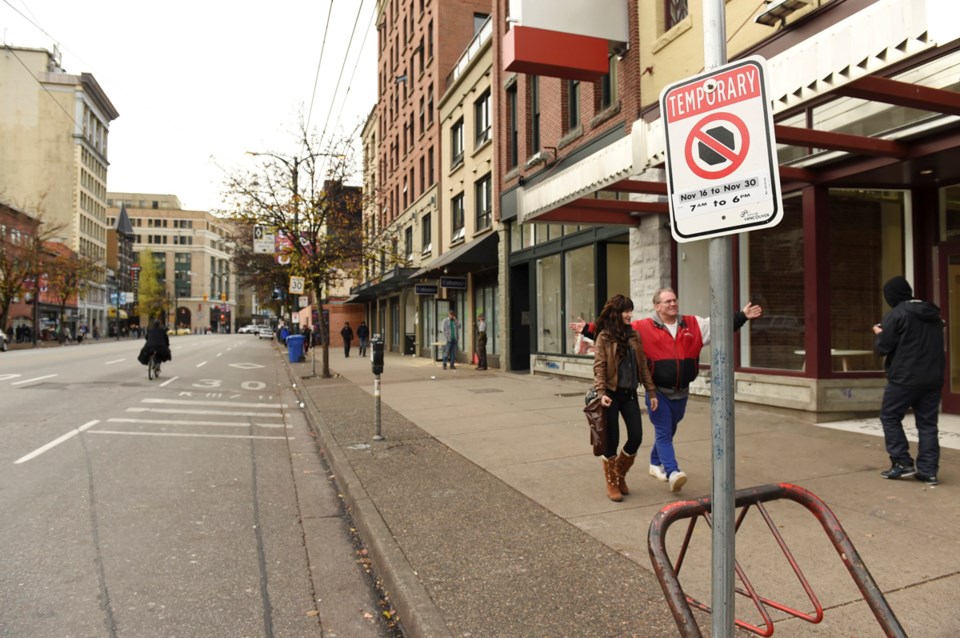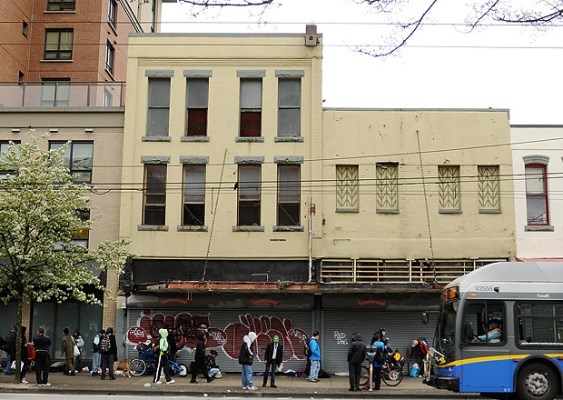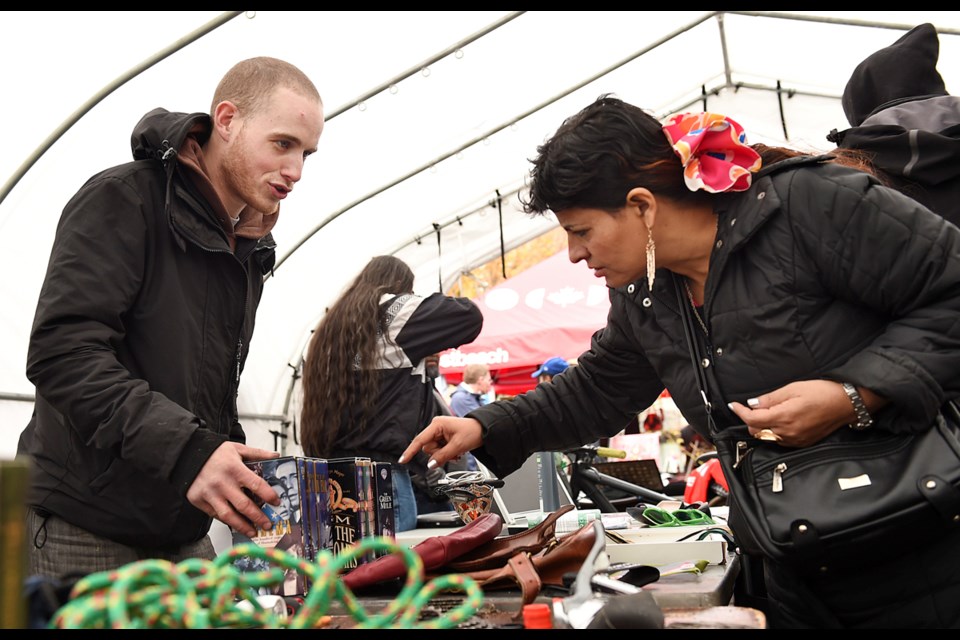Up until Monday, the north sidewalk of East Hastings Street that runs between Columbia and Carrall was a bustling centre for street vendors, drug dealers and a resting spot for homeless people.
By Wednesday, that scene was gone.

Citing increased health and safety concerns along a strip that has been tolerated by city officials and police for years, the City of Vancouver moved in to direct vendors to sanctioned selling sites and help the homeless find shelter.
By all accounts, including that of the Pivot Legal Society, the move was done without any force, ticketing or arrests, although not everybody was happy to leave the street.
"They're not going about it the right way," said Colton Devison, a formerly homeless man who has sold miscellaneous merchandise on the strip for three years. "They'll keep gentrifying and they'll keep pushing us and they'll think they'll solve the problem by cleaning up the area."
Devison and friend Chris Janelle, another vendor, spoke to the Courier at a city-sanctioned vending site at 62 East Hastings, an open lot across the street from the strip.
It's one of three the city set up in an effort to bring some control to vending in the Downtown Eastside. The two other sites are at Pigeon Park and 501 Powell St., although they are only open on weekends and the Pigeon Park site will cease operation at the end of the year.

Devison and Janelle, who reluctantly took refuge at what's known as Area 62, were attempting to sell VHS videos, DVDs, leather bags and other stuff they either bought from others or found in alleys and dumpsters.
Business was "horrible," they said, noting their vending spots were in the back of a tent, away from the sidewalk. The sanctioned site is also cramped, with a maximum of about 40 spots compared to the strip where up to 100 vendors could sell their wares.
"We legitimately rely on this block to support ourselves," said Devison, who collects welfare and has a drug habit. On the strip, on a good day, he said, he could make up to $300.
Added Janelle: "I have no choice but to stay here. This is the only thing I can be down here, unless I want to go be a criminal and sell dope and shit."
Lawyer Douglas King of Pivot Legal Society was on East Hastings Wednesday and said the city's move displaced at least a dozen homeless people who lived on the strip. Some of the homeless told him they found the strip safer than alleys and other spots around the city because they had friends on the street.
"You're taking a mass of people who organized there, had an economic centre with a client base and you're dispersing them," said King, standing outside the Area 62 site. "It was a place where people met socially and a place where people would sleep. We don't really know where they are now."
The increased police presence on the street, he said, has not only displaced homeless people but intimidated other residents who used to meet on the strip.
"There should be a clear message sent that people who are homeless can still sleep on the block and people can still congregate on the block, even if they're not allowed to vend on the block," King said.
Vision Vancouver Coun. Andrea Reimer said the decision to clear the block is part of a plan that goes back more than four years ago when the city set up the Pigeon Park vending market on weekends.
Reimer said council has long recognized that vending, for many people, fills a financial gap caused by inadequate social assistance rates.
That said, she said, the goal has always been to provide a safe environment for vendors. Spikes in crime along the strip, including two recent stabbings along with human waste littering the sidewalk, led to this week's action.
"It was not intended to be a sweep and I don't feel it had the characteristics of a sweep, which would imply the police come in and actively move people out," she said, noting the city's outreach staff felt more comfortable with police nearby. "It's a tough issue because you certainly don't want anyone to feel like they're being coerced into moving to a new location through having police presence. But at the same time, I can't really reasonably ask staff to go to work knowing there had been a recent stabbing and quite a spike in violent assaults."
Reimer denied accusations from poverty advocates that the city's action was done at the request of developers building social and market housing in the area.
"The two are not connected in the city's mind," she said.
Pivot Legal Society obtained emails through the Freedom of Information and Protection of Privacy Act between the city and developer Living Balance, which recently completed renovations to the former B.C. Collateral and Loans buildings on the strip at 71-77 East Hastings. In an email sent Feb. 2, 2015 from Geoffrey Howes of Living Balance to then-general manager of community services Brenda Prosken, Howes said police were called 12 times in two weeks so the owners could gain entry to the buildings.
"The street activity and the lack of enforcement have started to make the situation untenable in front of 71 East Hastings Street," Howes wrote on behalf of owner Steven Lippman, who also owns single-room occupancy hotels in the Downtown Eastside. "Add to the fact we were broken into on Saturday night by some thieves that did $4,000 worth of damage for the sake of $10 worth of copper."
Council gave Lippman the green light in April 2013 to go ahead with the renovation of the buildings, saying the project was consistent with city policy to maintain and upgrade housing in the neighbourhood.
In an interview, Lippman said he was glad the city cleaned up the strip outside the building, which he sold recently after completing a $4 million renovation.
"Finally, city hall said this has got to stop, which is a good thing," Lippman said. "I've never seen anything like that anywhere. It was basically a free-for-all. It was like a casbah of stolen goods and drug dealing.
He dismissed accusations from housing advocates that he was gentrifying the neighbourhood. Lippman noted nobody lived in the building's upper floors for more than 40 years. Now, he said, all 19 units have been rented, including five subsidized for seniors. A design studio has rented the commercial space.
Pivot's concerns about homeless people being displaced from the strip were responded to by the city in a news release issued as the Courier wrapped up its interview with Reimer. The city said six people from the strip were housed since Nov. 15. An additional 70 shelter spaces opened this week and 100 more beds will be available in December as part of the city's winter shelter strategy, the release said.
"The overarching issue here is that we have inadequate and stagnant — I mean they haven't moved in quite a while — social assistance rates," Reimer said. "And we have a lack of housing and the housing that is available is much more than the [$375 per month] shelter rate. So there is a giant gap in people's ability to secure basic needs and that's what drives the street vending."
Note: This story has been updated since first posted.
@Howellings



